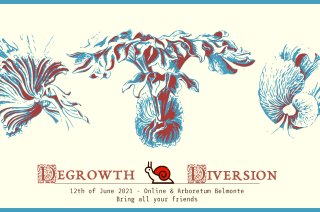
News
Review - Degrowth Diversion
Workshop Chizu Sato on Diverse Economies
On the 12th of June, Chizu Sato gave a workshop on Diverse Economies as part of the Degrowth Diversion. She is a lecturer at WUR and has done research in the areas of transnational feminism and political ecology. Also, she is very active in the organisation of the 8th International Degrowth Conference in the Hague at the end of August. This made her a good fit to be part of the event.
The workshop started with an exploration of our own economics habits, searching for actions that (unwillingly) contributed to the capitalist growth system we find ourselves in. The Diverse Economies Framework by Gibson-Graham was used to place these actions in a specific economic context based on transaction, labour and enterprise. Afterwards, the model was further explored to widen the perception of what are economic activities and what these imply in the different contexts. After exploring what the model could tell us, participants began to realize the central point of the model: should monetary wealth be at the centre of economic transactions or overall wellbeing?
Thereafter the participants were asked to formulate different activities that fall outside of the things we deem ‘normal’ in an economic context. Food systems and making them more local came forward very often, which is no surprise with most of the participants being related to the WUR. Also, transactions like a cleaning roster within your (student) house, sharing cars or volunteering increased in value if encountered from an angle of wellbeing.
All and all, the workshop accurately engaged the participants in the challenge of our economic system and what we consider normal herein. By actually using the model and seeing how it relates to everyday life, the possibility of a society that is not interested in growth became more tangible.
- Written by Maup van de Kerkhof
Workshop Inez Dekker on Degrowth as a way of living
The second workshop was held by Inez Dekker, Rotterdammer and Wageninger. Inez is a critical development thinker and is now exploring slow life in a rural village in the USA. She likes to think and be in rural (mind)spaces, embracing subjectivity and putting rest first.
In her workshop “Living degrowth”, Inez shared her research on the politics of slowness, temporality, and rest by putting these into relation to a daily Degrowth life. After all, degrowth is about deconstructing reality by framing it in a new way, and, thus, time must be reframed as well. As such, Inez invited us to deconstruct the idea of time by drawing it.
What does lunchtime look like in your own culture?
What does capitalism time look like?
And, so, what does “degrowth time” look like?
By sketching these concepts, we transformed and reframed our ideas into images rather than mere empty words. We exchanged our views about living degrowth in a capitalist society, where productivity is a synonym of success and rest becomes a synonym of failure. In a capitalist society, the idea of time itself is monetized. If you stop, you lose time; if you take a break, you lose an opportunity.
You must live fast because the world is fast. There is no time.
Every day: “I can’t do this because I have to…” and “I don’t have time to…” and “I wish I had time to…”.
"Wait a minute! What do you have to do?"
Live slowly, live present, live well. And, if you need a rest, take a rest. No one is running behind you.
So, “should we take a little nap together”?
Together with Inez, we closed our eyes, took a deep breath, and ended the workshop by actively taking the time for a cosy re-charging nap. Because, why not? Prioritizing your well-being is one of the first steps to finally, peacefully, “live degrowth”.
So, live slowly and take a nap.
- Written by Sara Mancinelli
